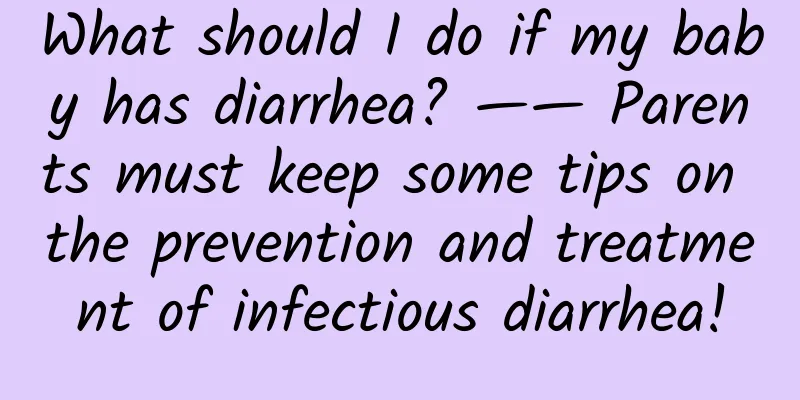What should I do if my baby has diarrhea? —— Parents must keep some tips on the prevention and treatment of infectious diarrhea!

|
As the temperature gradually rises, babies like to eat cold or raw food to cool off, but some babies then develop diarrhea, and some even have fever, abdominal pain, vomiting and other symptoms. Parents are very anxious about infectious diarrhea. The following is some knowledge about the prevention and treatment of infectious diarrhea, parents must keep it in mind! 1. What is infectious diarrhea? If your baby's stool characteristics change, such as loose stools, watery stools, mucous stools, or bloody stools; or if the frequency of bowel movements increases, more than 3 times a day, diarrhea may be the cause. Infectious diarrhea refers to diarrhea caused by pathogenic microorganisms. Pathogens include viruses, bacteria, fungi and parasites, among which viral infections, especially rotavirus infections, are the most common. In summer, bacterial infections are the main cause. Infectious diarrhea can occur throughout the year, with the peak incidence, prevalence and outbreaks in summer and autumn. 2. Clinical manifestations of infectious diarrhea Clinical symptoms of infectious diarrhea in children usually appear within 24 to 48 hours of infection and may vary depending on the type of pathogen and individual differences in the child. 1. Diarrhea: The main feature of infectious diarrhea in children is diarrhea, with frequent loose or watery stools, sometimes with a foul odor, blood or mucus. 2. Abdominal pain and discomfort: Infectious diarrhea in children is often accompanied by abdominal pain and discomfort, which may manifest as colic, tingling or dull pain. 3. Vomiting: Infection with certain pathogens can cause vomiting in children, leading to fluid loss and dehydration. 4. Fever: Infectious diarrhea in children may be accompanied by fever. Fever is one of the common symptoms of infection. 5. Dehydration and electrolyte and acid-base imbalance: Severe infectious diarrhea can lead to dehydration and electrolyte and acid-base imbalance in children, manifested by symptoms such as thirst, decreased urine volume, poor skin elasticity, and mental depression. 3. Treatment measures for infectious diarrhea 1. Prevent and correct dehydration Children lose body fluids and electrolytes when they have diarrhea. Timely replenishment of fluids and electrolytes is the key to preventing and correcting dehydration. Oral rehydration salts III can be taken orally. 2. Pay attention to diet conditioning High-sugar, high-fat and high-crude fiber foods are not recommended. Infants and young children who are breastfed should continue breastfeeding, and those who are formula-fed with lactose intolerance can choose low-lactose or lactose-free formula milk. For older children, there is no need to strictly restrict their diet, and the calorie supply should be guaranteed as much as possible. 3. Rational use of drugs It is recommended to seek medical attention promptly and use antibiotics or other anti-infective drugs to treat bacterial infections according to the doctor's advice. Montmorillonite powder, probiotics and zinc supplements can also be used for treatment. IV. How to prevent infectious diarrhea Infectious diarrhea is a preventable disease. Appropriate preventive measures can significantly reduce the incidence of such diseases. The main measures include: 1. Food hygiene: Ensure that children eat safe food and avoid eating raw and undercooked food. Provide children with safe drinking water, such as boiled water. 2. Pay attention to personal hygiene and environmental hygiene: Parents should educate their children to wash their hands frequently and develop good hygiene habits. 3. Promote breastfeeding 4. Vaccination: Vaccination with rotavirus vaccine is the most effective way to prevent rotavirus enteritis. |
>>: Why do people age? It's related to telomeres
Recommend
How to calculate the length of the menstrual cycle
What is the menstrual cycle table? Menstrual peri...
Why do my labia minora become swollen and painful?
Some women have swollen and painful labia, so it ...
Women sweat on their backs when they move
If a woman sweats on her back when she moves, it ...
Positive bacteria infection
Many pregnant women may experience positive bacte...
Leucorrhea has a sour smell
Leucorrhea, like menstruation, is a physiological...
What should pregnant women do if they have bacterial infections?
When a woman has just become a mother and is enjo...
How to lighten pregnancy spots?
Stretch marks are a fact that female friends ofte...
Why is Longjing called the Queen of Chinese Green Tea (because of its high quality and high value)
...
How to check if the fallopian tubes are open?
Many times, because some young couples do not hav...
How long does phototherapy for bacterial vaginosis last?
Bacterial vaginitis is a relatively common type o...
When are winter jujubes available? How should winter jujubes be stored in summer?
In the fruit market these days, I saw that winter...
What is the reason for yellow watery leucorrhea?
Women's leucorrhea is a physiological tissue ...
Yellow green purulent discharge
Abnormal leucorrhea is a very annoying gynecologi...
What happens during the first month of pregnancy?
Perhaps without knowing it, a new life has quietl...









